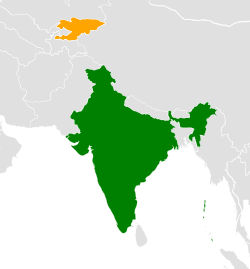
Kyrgyzstan has close relations with other members of the Commonwealth of Independent States, particularly Kazakhstan and Russia, given the historical legacy of the Soviet Union. It also has close relations with Turkey as well, given their shared heritage as Turkic languages.

Kyrgyzstan, officially the Kyrgyz Republic, is a landlocked country in eastern Central Asia, lying in the Tian Shan and Pamir mountain ranges. Bishkek is the capital and largest city. Kyrgyzstan is bordered by Kazakhstan to the north, Uzbekistan to the west, Tajikistan to the south, and China to the east and southeast. Ethnic Kyrgyz make up the majority of the country's over 7 million people, followed by significant minorities of Uzbeks and Russians.

The Ysyk-Köl Region is one of the regions of Kyrgyzstan. Its capital is Karakol. It is surrounded by Almaty Region, Kazakhstan to the north, Chüy Region to the west, Naryn Region to the southwest, and Xinjiang, China to the southeast. It takes its name from Lake Issyk-Kul, the world's second-largest high altitude lake. Its total area is 43,735 km2 (16,886 sq mi). The resident population of the region was 501,933 as of January 2021. The region has a sizeable Russian minority.
Alikbek Jekshenkulov is the former Foreign Minister of Kyrgyzstan (2005–2007) and now the leader of the oppositional party "Za spravedlivost".

Although Kyrgyzstan’s mountains and lakes are an attractive tourist destination, the tourism industry has grown very slowly because it has received little investment. In the early 2000s, an average of about 450,000 tourists visited annually, mainly from countries of the former Soviet Union. In 2018, the British Backpacker Society ranked Kyrgyzstan as the fifth best adventure travel destination on earth, stating that the country was an adventure travel secret that is "bound to get out soon."
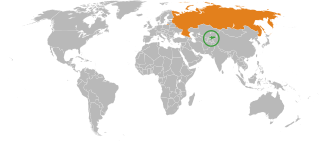
Kyrgyzstan–Russia relations are the relations between the two countries, Kyrgyzstan and Russia. Russia has an embassy in Bishkek and a consulate in Osh, and Kyrgyzstan has an embassy in Moscow, a consulate in Ekaterinburg, and a vice-consulate in Novosibirsk.

China–Kyrgyzstan relations are the bilateral relationship between China and Kyrgyzstan.

Kyrgyzstan–Uzbekistan relations refers to the bilateral diplomatic relations between the Republic of Uzbekistan and the Kyrgyz Republic. Uzbekistan dominates southern Kyrgyzstan both economically and politically, based on the large Uzbek population in that region of Kyrgyzstan and on economic and geographic conditions. Much of Kyrgyzstan depends entirely on Uzbekistan for natural gas; on several occasions, former president of Uzbekistan Islam Karimov has achieved political ends by shutting pipelines or by adjusting terms of delivery.

Pakistan formally consummated diplomatic ties with Kyrgyzstan on May 10, 1992, although relations were initially founded on December 20, 1991, shortly after Kyrgyzstan became independent of the Soviet Union. Consequently, Pakistan opened its diplomatic outpost in Bishkek in 1995.

Greece–Kyrgyzstan relations are foreign relations between Greece and Kyrgyzstan. Both countries established diplomatic relations in 1992. Greece is represented in Kyrgyzstan through its embassy in Almaty (Kazakhstan). Kyrgyzstan is represented in Greece through a non resident ambassador based in Bishkek. Kyrgyz consular representation in Greece is made by the Kazakh consulate in Athens. What is now Kyrgyzstan was settled by Scythians and was conquered by Alexander the Great.

Iran–Kyrgyzstan relations are foreign and diplomatic relations between Kyrgyzstan and Iran. Bilateral relations between Iran and Kyrgyzstan are mostly even and somewhat relaxed.
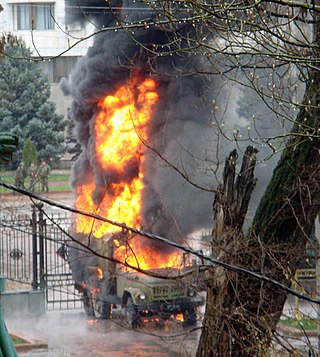
The 2010 Kyrgyz Revolution, also known as the Second Kyrgyz Revolution, the Melon Revolution, the April Events or officially as the People's April Revolution, began in April 2010 with the ousting of Kyrgyz president Kurmanbek Bakiyev in the capital Bishkek. It was followed by increased ethnic tension involving Kyrgyz people and Uzbeks in the south of the country, which escalated in June 2010. The violence ultimately led to the consolidation of a new parliamentary system in Kyrgyzstan.

Indo-Hungarian relations are the bilateral ties between India and Hungary. Indian embassy is located in Budapest and that of Hungary in New Delhi.

Sooronbay Sharip uulu Jeenbekov is a Kyrgyz politician who served as the 5th President of Kyrgyzstan from 2017 until his resignation in 2020, following a week of protests. Prior to that he served as the Prime Minister of Kyrgyzstan from April 2016 to August 2017.
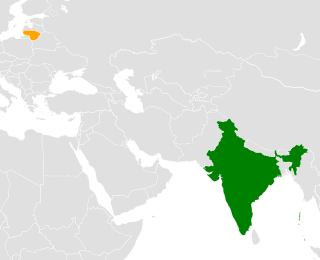
India recognized Lithuania on September 7, 1991, after independence. Diplomatic relations between India and Lithuania were established on 25 February 1992.
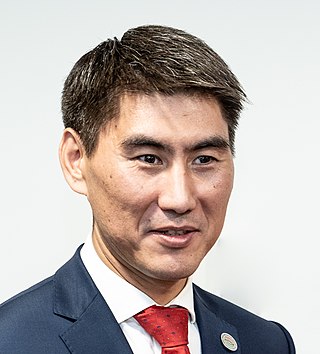
Chingiz Azamatovich Aidarbekov is a Kyrgyz diplomat who is a former Minister of Foreign Affairs of Kyrgyzstan serving in the position from October 2018 to October 2020.
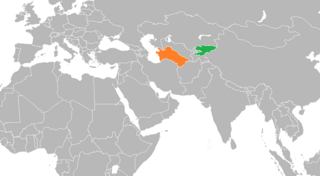
The two central Asian countries have shared relations for centuries, having previously been part of the former Soviet Union. The relations between the two nations mainly include economic, diplomatic and cultural ties. Both Kyrgyzstan and Turkmenistan are Turkic nations with similar cuisines, languages and cultures.

Sadyr Nurgojo uulu Japarov is a Kyrgyz politician who has been serving as the president of Kyrgyzstan since 28 January 2021. He previously held the post of acting prime minister of Kyrgyzstan in the 2020 interim government, following the resignation of President Sooronbay Jeenbekov. Japarov also became acting president of Kyrgyzstan after Jeenbekov's resignation, but resigned himself on 14 November 2020 to run for the 2021 presidential election, in which he was elected to succeed the acting president, Talant Mamytov.
